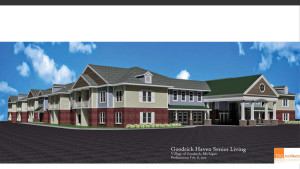By David Fleet
Editor
Goodrich- The village planning commission will discuss a request to rezone property for a proposed low- income senior living apartment complex at 6 p.m., July 24 at the lower level of the village administration building, 7338 S. State Road.
The proposal to rezone the vacant property from Low Density Residential to a Residential Planned Unit Development is on about 5.5 acres on the north side of Hegel Road about 600 feet east of M-15. If approved, the Goodrich Haven Senior Living complex, a single senior housing building with 62 units, will be built on the property. The complex is for low-income seniors under the guidelines of the Michigan State Housing Development Authority. The complex would feature two-bedroom and one-bedroom apartments. The MSHDA funded project would target senior citizens 62 years and older who are capable of independent living.
On Feb. 27 a similar recommendation was OK’d by the village planning commission PUD zoning by a vote of 7-0. However, on March 6 the village council by a 3-2 narrowly defeated the zoning change. Councilmembers Jake Vick, who made the motion, Tim Light and Tim Barraco voted to deny rezoning.
Council President Mark Baldwin and Councilmember Shannon R. McCafferty voted to approve.
Since March the proposal for the complex has been revised and organizers will now bring more information, along with a smaller complex, to the planning commission.
“The response from the community has been outstanding over the past two years,” said long-time area resident Emery Bennett, who says the concept has been in the works for almost 15 years. “We feel there is a growing need for affordable housing for seniors and it is becoming more and more evident as our population ages. We have a list of individuals ready to be considered for this complex.”
Bennett said the new proposal is scaled back by a few units, but still provides the same amenities as the previous consideration.
“This will be a quality facility in the village,” he said. “There will be a bus available for residents to go shopping out of the community and like before, residency will be based on income. The facility will provide a much needed resource for seniors.”
Jerome Jay Allen, director of Devonshire Advisors, a Rochester Hills company, will coordinate the project.
“We’ve reduced the size by eight units,” said Allen. “The meeting on July 24 will also include Mark Piper, owner of Piper Management, who will manage the facility and answer questions regarding eligibility and upholding the age requirements.”
Allen said during the March debate some were concerned over the rules enforcement at the senior complex.
“The 62-year-old age minimum was a previous concern by village residents,” he said. “Mark will answer any concerns area residents may have since he manages similar properties in the area. The communities where we have senior facilities are welcoming. The senior complexes are a desired place to live.”
Allen emphasized similar senior complexes attract residents from their hometown or at least nearby.
“If a senior lived in Goodrich or Atlas Township for many years they want to come back to stay,” he said. “They want to be near family.”
The property was purchased about six years ago from the Goodrich United Methodist Church. The development proposes a courtyard type design with about a third of the site to remain in a natural state. Funding for the project comes from the MSHDA who, once the project is approved, will issue low-income housing tax credits to investors to build the affordable rental housing. The corporations, banking institutions, or individuals then claim a credit against their tax liability annually for a period of 10 years.
Katie Bach, communications director for MSHDA, said when low-income housing tax credits are issued, it is truly a public-private partnership. “We award credits two times a year and have the overarching authority to monitor for compliance and ensure the management company is renting to qualified people and keeping the property in good physical condition,” she said. “Investors are putting millions of dollars into a project, so they have a vested interest in monitoring for its success. This partnership is a win-win-win for the developer, tenants and community.”
